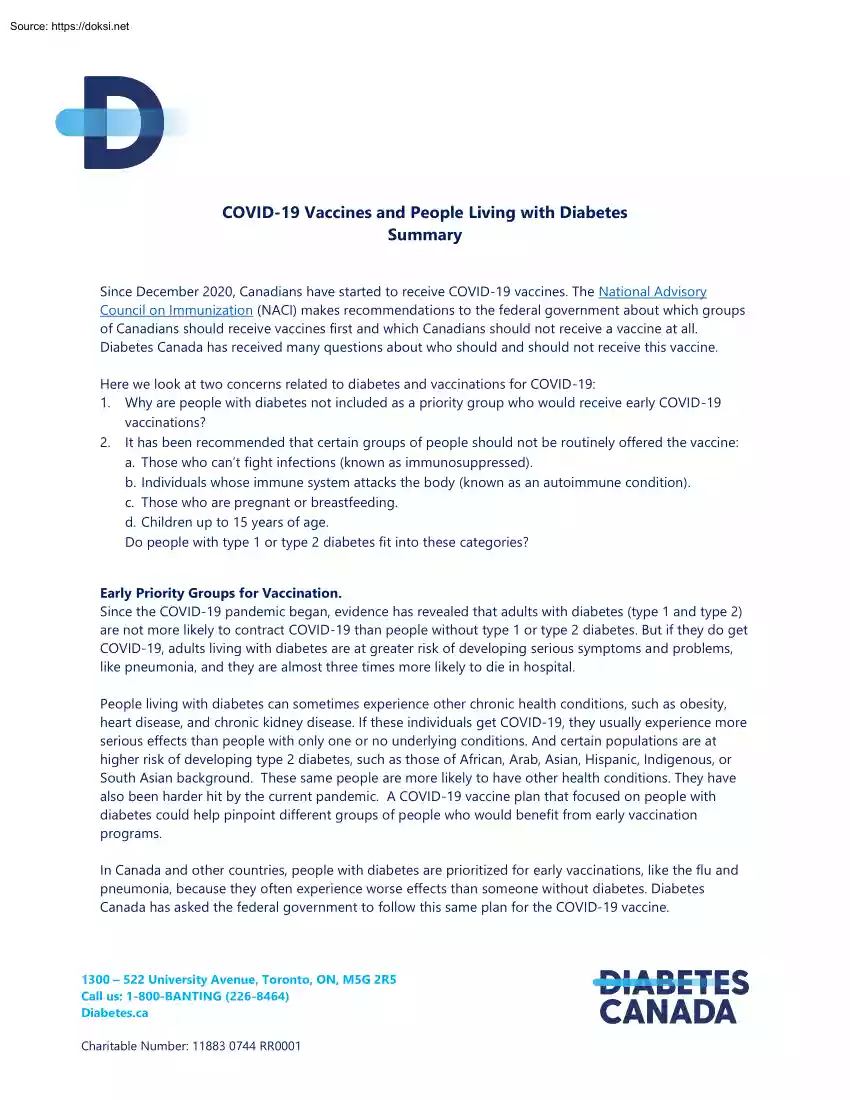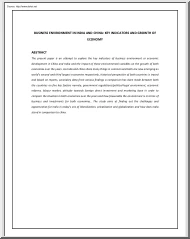A doksi online olvasásához kérlek jelentkezz be!

A doksi online olvasásához kérlek jelentkezz be!
Nincs még értékelés. Legyél Te az első!
Mit olvastak a többiek, ha ezzel végeztek?
Tartalmi kivonat
COVID-19 Vaccines and People Living with Diabetes Summary Since December 2020, Canadians have started to receive COVID-19 vaccines. The National Advisory Council on Immunization (NACI) makes recommendations to the federal government about which groups of Canadians should receive vaccines first and which Canadians should not receive a vaccine at all. Diabetes Canada has received many questions about who should and should not receive this vaccine. Here we look at two concerns related to diabetes and vaccinations for COVID-19: 1. Why are people with diabetes not included as a priority group who would receive early COVID-19 vaccinations? 2. It has been recommended that certain groups of people should not be routinely offered the vaccine: a. Those who can’t fight infections (known as immunosuppressed) b. Individuals whose immune system attacks the body (known as an autoimmune condition) c. Those who are pregnant or breastfeeding d. Children up to 15 years of age Do people with type 1 or
type 2 diabetes fit into these categories? Early Priority Groups for Vaccination. Since the COVID-19 pandemic began, evidence has revealed that adults with diabetes (type 1 and type 2) are not more likely to contract COVID-19 than people without type 1 or type 2 diabetes. But if they do get COVID-19, adults living with diabetes are at greater risk of developing serious symptoms and problems, like pneumonia, and they are almost three times more likely to die in hospital. People living with diabetes can sometimes experience other chronic health conditions, such as obesity, heart disease, and chronic kidney disease. If these individuals get COVID-19, they usually experience more serious effects than people with only one or no underlying conditions. And certain populations are at higher risk of developing type 2 diabetes, such as those of African, Arab, Asian, Hispanic, Indigenous, or South Asian background. These same people are more likely to have other health conditions They have also
been harder hit by the current pandemic. A COVID-19 vaccine plan that focused on people with diabetes could help pinpoint different groups of people who would benefit from early vaccination programs. In Canada and other countries, people with diabetes are prioritized for early vaccinations, like the flu and pneumonia, because they often experience worse effects than someone without diabetes. Diabetes Canada has asked the federal government to follow this same plan for the COVID-19 vaccine. 1300 – 522 University Avenue, Toronto, ON, M5G 2R5 Call us: 1-800-BANTING (226-8464) Diabetes.ca Charitable Number: 11883 0744 RR0001 Groups who should not be offered the COVID-19 vaccines. NACI has recommended that certain groups of people should not be offered the vaccines, either because the vaccine manufacturers did not include these groups in the clinical trials of the vaccine, or because they participated in very small numbers. In both cases, there isn’t enough information to know how
these groups reacted to the vaccine. We take a look at these groups below • Those who can’t fight infections. For the purposes of the COVID-19 vaccine trials, people with type 1 or type 2 diabetes are not considered in this group. • People who have a condition where the immune system attacks the body (also known as autoimmune). Although type 1 (and not type 2) diabetes is an autoimmune condition, people with type 1 diabetes were not excluded from the vaccine trials. In fact, 3,163 people with either type 1 or type 2 diabetes were included in the Pfizer-BioNTech phase 3 study and 2,875 people with diabetes were included in the Moderna phase 3 study. These participants did not experience major issues with the vaccines. Diabetes Canada has asked that the vaccine recommendations for individuals who can’t fight infections and/or have an autoimmune disorder be clarified, as we believe they do not apply to people with type 1 or type 2 diabetes. Diabetes Canada encourages people
living with type 1 or type 2 diabetes to receive the COVID-19 vaccine when it is available, and to talk with their health-care provider. Those who are pregnant or breastfeeding. Women who are pregnant or breastfeeding were not part of the clinical trials, though some women became pregnant during the trials and experienced no major issues from the vaccine. Children up to 15 years of age. Children with diabetesmost often, type 1 diabetesare not at increased risk of developing COVID-19, and if they do contract the virus, their illness is milder than adults with diabetes. But children still have the potential to pass the virus to others and excluding them risks excluding an entire generation from the benefits of a national program to get a vaccine. Both groups will be included in future vaccine clinical trials. Until then, people in these groups can get the COVID-19 vaccine if: • the use of the vaccine is better than any of the possible side effects, and • the individual (or their
caregiver) understands that there is incomplete information to know how they may react to the vaccine. Diabetes Canada encourages women with diabetes who are pregnant or breastfeeding, and parents of children with diabetes to learn about the most up-to-date public health guidance and talk with their health-care provider to make the best decision for them. 1300 – 522 University Avenue, Toronto, ON, M5G 2R5 Call us: 1-800-BANTING (226-8464) Diabetes.ca Charitable Number: 11883 0744 RR0001 Vaccine side effects. Some people can experience mild reactions from vaccines, such as: • pain, redness or swelling at the injection site, and/or • mild fever after the vaccination. Depending on the vaccine received, some people may also experience a mild rash, become tired, and have aches. All these are common reactions and go away in a few days If you have questions about the getting the vaccine, please discuss your specific circumstance with your doctor. Meanwhile, we can all do our part
to reduce our risk of getting COVID-19 and of spreading the virus. Follow local public health guidelines, such as: • Observe physical distancing rules with people not in your household. • Wear a mask. • Avoid indoor gatherings. • Practice good hand hygiene. Our Frequently Asked Questions about COVID-19 and diabetes can be found on our website. If you have diabetes and you become unwell for any reason, it is important that you practice sick day management. That includes staying in touch with your diabetes care team. 1300 – 522 University Avenue, Toronto, ON, M5G 2R5 Call us: 1-800-BANTING (226-8464) Diabetes.ca Charitable Number: 11883 0744 RR0001
type 2 diabetes fit into these categories? Early Priority Groups for Vaccination. Since the COVID-19 pandemic began, evidence has revealed that adults with diabetes (type 1 and type 2) are not more likely to contract COVID-19 than people without type 1 or type 2 diabetes. But if they do get COVID-19, adults living with diabetes are at greater risk of developing serious symptoms and problems, like pneumonia, and they are almost three times more likely to die in hospital. People living with diabetes can sometimes experience other chronic health conditions, such as obesity, heart disease, and chronic kidney disease. If these individuals get COVID-19, they usually experience more serious effects than people with only one or no underlying conditions. And certain populations are at higher risk of developing type 2 diabetes, such as those of African, Arab, Asian, Hispanic, Indigenous, or South Asian background. These same people are more likely to have other health conditions They have also
been harder hit by the current pandemic. A COVID-19 vaccine plan that focused on people with diabetes could help pinpoint different groups of people who would benefit from early vaccination programs. In Canada and other countries, people with diabetes are prioritized for early vaccinations, like the flu and pneumonia, because they often experience worse effects than someone without diabetes. Diabetes Canada has asked the federal government to follow this same plan for the COVID-19 vaccine. 1300 – 522 University Avenue, Toronto, ON, M5G 2R5 Call us: 1-800-BANTING (226-8464) Diabetes.ca Charitable Number: 11883 0744 RR0001 Groups who should not be offered the COVID-19 vaccines. NACI has recommended that certain groups of people should not be offered the vaccines, either because the vaccine manufacturers did not include these groups in the clinical trials of the vaccine, or because they participated in very small numbers. In both cases, there isn’t enough information to know how
these groups reacted to the vaccine. We take a look at these groups below • Those who can’t fight infections. For the purposes of the COVID-19 vaccine trials, people with type 1 or type 2 diabetes are not considered in this group. • People who have a condition where the immune system attacks the body (also known as autoimmune). Although type 1 (and not type 2) diabetes is an autoimmune condition, people with type 1 diabetes were not excluded from the vaccine trials. In fact, 3,163 people with either type 1 or type 2 diabetes were included in the Pfizer-BioNTech phase 3 study and 2,875 people with diabetes were included in the Moderna phase 3 study. These participants did not experience major issues with the vaccines. Diabetes Canada has asked that the vaccine recommendations for individuals who can’t fight infections and/or have an autoimmune disorder be clarified, as we believe they do not apply to people with type 1 or type 2 diabetes. Diabetes Canada encourages people
living with type 1 or type 2 diabetes to receive the COVID-19 vaccine when it is available, and to talk with their health-care provider. Those who are pregnant or breastfeeding. Women who are pregnant or breastfeeding were not part of the clinical trials, though some women became pregnant during the trials and experienced no major issues from the vaccine. Children up to 15 years of age. Children with diabetesmost often, type 1 diabetesare not at increased risk of developing COVID-19, and if they do contract the virus, their illness is milder than adults with diabetes. But children still have the potential to pass the virus to others and excluding them risks excluding an entire generation from the benefits of a national program to get a vaccine. Both groups will be included in future vaccine clinical trials. Until then, people in these groups can get the COVID-19 vaccine if: • the use of the vaccine is better than any of the possible side effects, and • the individual (or their
caregiver) understands that there is incomplete information to know how they may react to the vaccine. Diabetes Canada encourages women with diabetes who are pregnant or breastfeeding, and parents of children with diabetes to learn about the most up-to-date public health guidance and talk with their health-care provider to make the best decision for them. 1300 – 522 University Avenue, Toronto, ON, M5G 2R5 Call us: 1-800-BANTING (226-8464) Diabetes.ca Charitable Number: 11883 0744 RR0001 Vaccine side effects. Some people can experience mild reactions from vaccines, such as: • pain, redness or swelling at the injection site, and/or • mild fever after the vaccination. Depending on the vaccine received, some people may also experience a mild rash, become tired, and have aches. All these are common reactions and go away in a few days If you have questions about the getting the vaccine, please discuss your specific circumstance with your doctor. Meanwhile, we can all do our part
to reduce our risk of getting COVID-19 and of spreading the virus. Follow local public health guidelines, such as: • Observe physical distancing rules with people not in your household. • Wear a mask. • Avoid indoor gatherings. • Practice good hand hygiene. Our Frequently Asked Questions about COVID-19 and diabetes can be found on our website. If you have diabetes and you become unwell for any reason, it is important that you practice sick day management. That includes staying in touch with your diabetes care team. 1300 – 522 University Avenue, Toronto, ON, M5G 2R5 Call us: 1-800-BANTING (226-8464) Diabetes.ca Charitable Number: 11883 0744 RR0001




